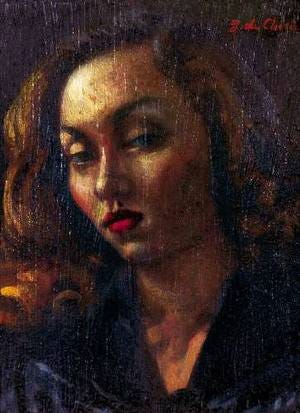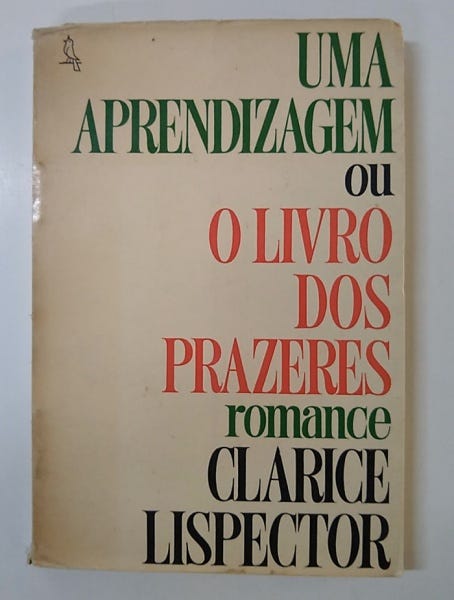An interview with Clarice Lispector
Celebrating the new translation of An Apprenticeship or the Book of Pleasures
Interviews with Clarice Lispector are rare. She wasn’t exactly reluctant to do them, but the times were different. People didn’t get interviewed as much. There was no internet. There were no book tours. At most, an author might sign copies at a bookstore.
Clarice went on television a single time, shortly before her death in 1977. (You can watch those famous twenty-two minutes here.) The interviewer felt he’d failed to do a better job of capturing his country’s greatest writer, and the occasion nearly drove him mad. I tell this disturbing story in Why This World.
In 1969, following the publication of An Apprenticeship or The Book of Pleasures, Clarice gave a short interview to Norma Pereira Rego of Última Hora. (Pode lê-la em português aqui.)
To celebrate the arrival of this book in English, I wanted to translate that interview, to give a feeling for how Clarice sounded when talking about the book.
Lispector — Always in a Higher Pitch
“I’m much less lofty, much more accessible to people.”
That was the first answer Clarice Lispector gave me. As soon as I entered her living room I saw a small painting of a beautiful woman. It was Clarice herself. Painted by De Chirico, when she was living in Rome. She still has the same strangely shaped almond eyes and the same strong mouth. Only the cheekbones are less prominent because the face is fuller. I took two books out of my bag for her to autograph.
“The first and the last.”
That was her comment. It was an old Portuguese edition of Near to the Wild Heart and the brand-new one just published by Sabiá: An Apprenticeship or The Book of Pleasures.
“I thought The Book of Pleasures was much easier to read than any of your other seven books. Do you think there’s any reason for that?”
“There is. I humanized myself. The book reflects that.”
In the book Family Ties, there’s a story that makes me cry every time I read it. It’s called “Preciousness.” Clarice narrates the moment in which a tough teenage girl, closed up in herself, discovers that she needs to start to soften.
“If that character of yours, that fifteen-year-old girl, was forty today, do you think she’d still feel ‘ugly and precious’?”
“It’s not about feeling, it’s about knowing that inside us exists something to take great care of because it’s very fragile.”
Children and Maids
“The Book of Pleasures was the last one, I don’t plan to write again.”
“Why?”
“What a question! Because it hurts a lot.”
She started to scribble at the age of seven, at the age of fifteen she published her first novel. (Note: in fact, she was twenty-three.) She never thought about writing poetry. (Note: in fact, she did write some poetry in her youth.) She came from Recife when she was twelve. In Rio she married a diplomat and lived in several countries. She has three children. (Note: in fact, two.) She won’t admit to having her style influenced by any other writer.
“You can see that Lawrence, whom I love, has nothing to do with what I write.”
“What about Katherine Mansfield?”
“No. She has an intimist style and emphasizes small facts of daily life, I don’t think that’s my way of writing.”
Every Brazilian writer who has come up in the last twenty years has read Clarice Lispector. Some were marked by her, others went ahead and copied her. She really does have something strongly personal in her style and she resembles her books. She’s dense, without the slightest sense of humor, always in a higher pitch, just like Lúcio Cardoso, who was her friend.
The great thing is that she never covered up that she’s a woman when writing her stories.
“Of course, I have too much respect for women to try to hide it.”
Wearing a blue dress of piquet fabric in summertime, running out to buy a new swimsuit, rummaging through the maid’s room are feminine experiences that it doesn’t occur to her to hide. Which means that Clarice proved that children and maids are great themes. It just depends who’s writing about them.
Colon and Comma
“People have already said that this isn’t going to be my last book because I ended it with a colon.”
“And you started it with a comma, right?”
“Yes, but starting with a comma wasn’t just being cute. I caught this woman in the middle of life, in the middle of a thought.
“Was this book written a while ago?”
“No, a year ago.”
“Do you think much about the past?”
“Not when I’m writing. I make everything up.”
“And in your daily life?”
“In my daily life I think about the past a lot.”
She asked me to make the interview short; she was tired. I’m remembering now the last sentence in one of her novels. “From any struggle or fatigue I shall arise strong and beautiful like a young horse.” That was a profession of faith. Clarice, your readers hope for more books.
In case you missed it:
Sheila Heti on Clarice Lispector
Audrey Wollen in The New York Times on An Apprenticeship
Support our project and buy the book!
Tell me what you think!
Share this post!
Consider subscribing!



Beautiful